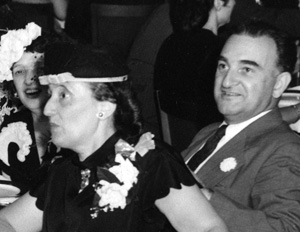Oscar and Esther, on "This I Believe"

Esther and Oscar, 1946
Oscar Hirschmann and Esther Bloom were a very interesting couple. Oscar was a published poet, who wrote under the name of Oliver Hale. He was born in New York City on August 2nd, 1897. Oscar had a number of interesting ancestors, including Isaac, his grandfather Samuel's brother. Isaac was born in 1817 as the son of Rabbi Jacob Hirschmann, but changed his name to Hellmuth (his mother's maiden name), converted to the Anglican church, and eventually became a Anglican Bishop in Canada. Furthermore, Oscar's grandmother Fanny (nee Caspari) was from an Italian family which counted a Cardinal as a member.
In 1922, he married Esther Bloom, a graphologist, who was also from New York, born on May 29, 1891. Esther was my great aunt - my grandfather David Bloom's sister.
They had a long (over 55 years!) and evidently wonderful marriage - Oscar frequently wrote essays and poems about his love for his wife. Although they never had children, they did publish together a historical account of children's games in New York City. Esther died in on November 22, 1979, and Oscar five years later on January 30, 1984, after having moved to California.
In the 1950's, they appeared (under the names Mr. and Mrs. Oliver and Ethel Hale) on the radio show "This I Believe", hosted by Edward R. Murrow. Here is the original recording of their appearance on the show, introduced by Murrow, along with a transcript of their essay entitled "Love and the Unceasing Wonder of Life":
Love and the Unceasing Wonder of Life
Click the "play" button to hear the recording
Mrs. Hale: On sudden impulse the other day, my husband sat down and, in a few minutes, wrote out the beliefs which follow. They are my beliefs, too, since they evolved from our lives together. Our lives have been so closely intertwined that he speaks of them as if they were a single unit.
Mr. Hale: As two people united in a good marriage for 30 years, we have come to a time when we must face the time of separation. Normally, this aroused in both a fear of being left alone and dread of a future in which the other is absent. The prospect would seem to be bleak, but remarkably, it is not so. The world, possessed by the survivor, would still be a place of lively and insistent interest. It would still be breathtakingly beautiful. The heavens would continuously proclaim to the imagination the unfathomable and the infinite.
Love runs through our united life like a stream, and because it has been a great irrigating force, the days are always green. We have had little barrenness, whether of the mind or the spirit. Because we have loved each other as unselfishly as is humanly possible, we find it natural to love our fellow man. We are not saints. Human behavior is sometimes unforgivable. We do not condone the great crimes against peoples or the little crimes individually perpetrated. It is difficult to pardon them. It is difficult not to ask revenge or punishment. But there was one who had compassion in His heart for the multitude and for the sinner. We do not presume to measure our very human attitude against the blinding divinity of that great spirit, but love calls out in our hearts for compassion, for understanding.
We believe in man’s innate goodness, as much as we believe in a child’s natural innocence. We believe that the achievements of man are greater than his failures. We believe in man’s essential goodness, in his soul’s aspiration, whether toward his god or in search of an answer to his being. At night, or at other quiet times, reading the great books, listening to the great music, we are moved to believe that all being is longing after something—a cry from the deepest recesses of the heart. But it does not seem to answer, except that we believe, and many do not, and they are most lost. Shall we not, then, have compassion upon them?
We believe in this—we, two people, united in a long marriage that has been marked by love and understanding. We have neither fame nor wealth and are known to a very small number of people. We are obscure and of the great majority. But we have known love and found it good, and we have tried to live compassionately and to be just to our fellow man. And when someday we shall separate, as we indeed must, the one who remains will grieve and be sad, but the power of love will act as a strong and continuing will to live and to marvel at the unceasing wonder of life and the universe.